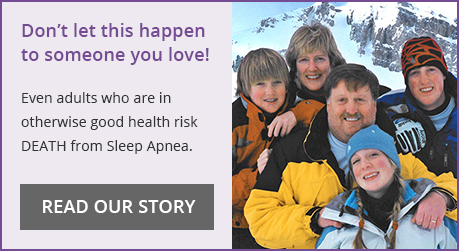Do You Have?
- Snoring
- Feelings of tiredness, fatigue or sleepiness during the day
- Snoring that affects my relationship
- Snoring that causes me or my partner to be irritable and/or tired
- Snoring that causes me to sleep in a separate room
- Snoring that affects other people when I am sleeping away from home (hotel, camping, etc.)
- Been told that you have to wear a CPAP because you have Sleep Apnea

If you’ve answered yes to two or more of the above items, click here to complete a SLEEP SCREENING QUESTIONNAIRE.
A Problem Too Dangerous To Ignore
Hear an article from NPR on Sleep Apnea and treatment options (turn your volume up, if needed)
If you have sleep apnea, you’re probably going to stop breathing hundreds of times a night and wake up literally gasping for air. Every time breathing stops, the oxygen level in the blood falls. Eventually, the brain notices the drop and must arouse the body to begin breathing again. Consequently, REM sleep (the deep, restorative sleep cycle) is interrupted, putting additional strain on the heart and lungs to “catch up”. So, in addition to reducing the amount of restful sleep, it also reduces the amount of oxygen supplied to the brain which can lead to various health problems including early morning headaches, excessive daytime drowsiness, cardiovascular problems, memory problems, mood swings, impotence, and Gastroesophageal Reflux Disease (GERD).
Fortunately, there’s an answer: new treatment that means you don’t have to choose between the dangers of sleep apnea and the discomfort of CPAP therapy.
Convenient Diagnosis In The Comfort Of Your Own Bed
Obstructive Sleep Apnea is diagnosed by performing a sleep study where a medical recording device is used to record the involuntary body functions that occur during sleep. It is usually conducted in a laboratory environment although we offer the option of a home sleep study. A home sleep study is similar to a typical laboratory sleep study except that it is performed in the comfort of your own home using a small portable monitoring device that you wear while you sleep. Home sleep testing is a recognized procedure for the diagnosis and/or monitoring of sleep disordered breathing. If you meet the following criteria, you can take a home sleep test.
- You are between 18 and 65 years of age;
- You snore or are at risk of mild, moderate or severe sleep apnea;
- You have no other medical conditions.
Sleep Apnea Patient Testimonial
“I had been showing signs of tooth wear over the years from grinding my teeth and it was suggested by Dr. Barbat I take a TMJ exam. I put off having the TMJ exam for over a year until I broke off a veneer on my front tooth due to the excessive grinding of my teeth during the night. I called Dr. Barbat’s office that morning and they had me come in that same day for the repair. Anna of Dr. Barbat’s staff fixed my tooth and had brought up the TMJ exam again. I realized then that I needed to do the TMJ exam, especially after hearing her experience relating to TMJ issues and how Dr. Barbat was able to help her. So I scheduled the TMJ exam (2/2015) and the findings were eye opening. Up to this point I had been having issues with fatigue and pain in my arm/elbow (tendonitis like), numbness in my hands, and inflammation in my shoulder blade area. Being an Engineer, I had been doing everything to try to address these issues through numerous doctor appointments and expensive testing (MRI, EMG, X-rays, Blood Tests for high hemoglobin and iron, etc.) to try to root cause my issues. The TMJ Exam findings showed that I did have TMJ issues and possibly Sleep Apnea. From my limit research, other than the snoring and fatigue, I didn’t fit the profile of a person who would have Sleep apnea being 165 lb, 5’11” with a 15.5″ neck. But I wanted to trust Joe’s findings, so I had a Sleep Apnea test performed at a Sleep Study Lab and was surprised to find my sleep index to be 17.1 events per hour (moderate case of obstructive sleep apnea). Once I had the Sleep Study results I was finally able to connect the dots. It all started to make since. Once I started the treatment process, I started to see improvements and am now back to being more active, playing with my kids & wife and enjoying life more.”
R. K., patient of Dr. Ban Barbat
A Simple, Effective Solution
Now, today’s comfortable and effective FDA-approved devices can help keep airways open without CPAP machines that many sleep apnea sufferers simply can’t tolerate. These custom-made devices have a number of advantages over CPAP machines.
- Oral devices are truly comfortable.
- Most patients get used to them in just a few days.
- They’re small & convenient so traveling with them is a breeze.
In fact, these small, light oral devices work so well they are now considered an effective alternative to CPAP for patients with mild to moderate sleep apnea and for those with severe sleep apnea who can’t tolerate a CPAP machine.
A Comfortable Fit That Conforms To YOU!
There are many types of oral devices, each with different advantages. My job is to find the right one for you, based on things like the severity of your apnea, the size and shape of your jaw and tongue and whether you grind your teeth or have a condition like TMJ.
If you’re one of the millions who would love to throw away their CPAP machine or someone newly diagnosed with sleep apnea who’s looking for a treatment that really works, there’s an oral device that’s right for you. We’ll help you choose the right device, then fit it precisely so it works effectively and gives you all the comfort you’re looking for.




